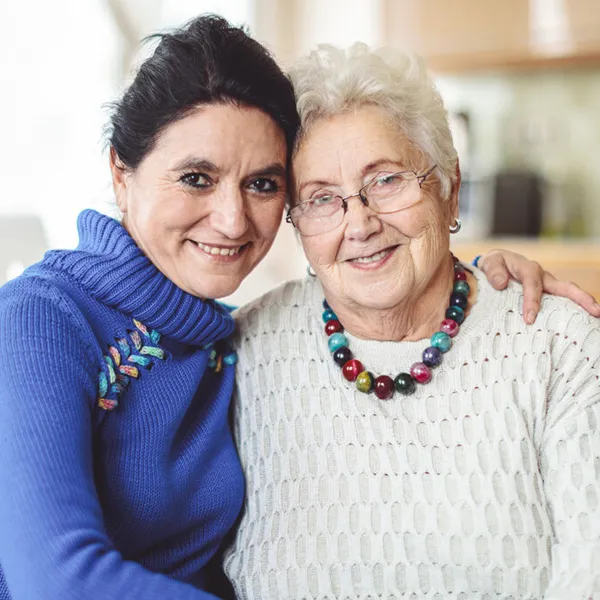
Your Gift Can Make 2x the Impact
Your Gift Can Make 2x the Impact
A gift can go twice as far during our February $100,000 2x Match. Your contribution by Feb. 27 will fuel Alzheimer’s research and help provide essential care and support.
Donate NowBillings nurse has a unique passion for Alzheimer's education
There isn’t much in the world of medicine that surprises Cyndy Martin. After 46 years as a nurse, she’s seen it all. And one thing she’s learned is that nobody is ready for the challenges that an Alzheimer’s diagnosis will create for a family. As the vice-chair of the Montana Alzheimer's Association board, she hopes to change that.
In her 46 years as a nurse, Cynthia (Cyndy) Martin has seen pretty much every medical condition imaginable. But there’s one she knows intimately from seeing it steal the life of her own mother. It’s that disease - Alzheimer's – that motivates her to drive 75 miles or more each way to deliver a one-hour presentation on a Montana winter night to an audience that needs the information.
The vice-chair of the Alzheimer's Association of Montana board of directors, Martin has driven farther than that for personal reasons related to the disease. She would travel regularly – 550 miles each way – to see her mother in North Dakota as her Alzheimer’s diagnosis progressed before she was finally able to convince mom to relocate to Billings, with the help of a flood.
A clinical coding specialist at Billings Clinic, Martin worked in home health care before taking on her current role, providing education to physicians and coders regarding coding specifics and insurance denials.
“I fight hospital denials,” she said proudly. “I really enjoy what I do. I’ve got the best of both worlds.”
The other world that Martin occupies is Alzheimer's disease community education.
“That’s where I can put my nursing knowledge and Alzheimer's information together,” said Martin. “I’m hoping to do team meetings of nurses in Billings (grand rounds) to educate them on communicating effectively with a dementia patient.”

The key, Martin believes, is for people to take action if they see changes in a loved one that might possibly be a warning sign of Alzheimer's disease or another form of dementia. She admits that she didn’t follow that recommendation herself when her mother’s behaviors began changing.
“I did not see, or didn’t want to see, what was going on with mom,” she said. “I didn’t want to admit it. I was dealing with things in my heart and not my brain. And (mom was) out of sight, out of mind. I was busy with my family.” Martin knows now that she would have benefited from the education and resources available through the Alzheimer's Association, if she had access to them at that time, and might have made different choices.
When circumstances required that Martin and her husband move her mom to an assisted living residence, her mom didn’t want to leave North Dakota, so Martin continued the 550-mile treks each way for visits. Finally, a flood in the area of mom’s residence helped them convince her that it would be safer to relocate to Billings.
“Mom, the river’s rising,” she said. “We’re moving.”
Sharing her learning process with other families
Martin realizes that in a rural state like Montana, information about a disease like Alzheimer’s may not be readily available to everyone, even the medical professionals working in her own clinic.
“I do physician education and share any Alzheimer’s information when possible,” she said. “I want to make sure that the professionals at the Clinic know of the Alzheimer’s Association resources that are all offered at no charge. I present to in-patient and out-patient care teams.”
Part of the rationale that Martin offers is that if the medical team at the Clinic knows where they can refer patients for more disease-specific information, then they won’t need to field as many calls about a disease that they may not be comfortable handling.
“Sending Alzheimer’s patients to the emergency department is not the right answer,” she said.
Honoring mom
Martin’s commitment to the Alzheimer's cause goes beyond community education. She leads the Montana chapter’s golf fundraiser, and has organized her own fundraising team for the annual Walk to End Alzheimer’s. And, coincidentally, her mom’s birthday, Nov. 9, coincides with the date she joined the Montana chapter’s board.
“That’s my passion. That’s why I’m involved,” she said. “I love doing this (volunteering with the Alzheimer's Association.) My goal is that when I retire, I can still do this.”
There are 21,000 Montanans among more than seven million Americans living with Alzheimer’s disease. To learn more about the information, programs and services offered at no charge by the Alzheimer’s Association, go to alz.org. To schedule an Alzheimer’s presentation or speak to a trained professional, call the Association’s free 24/7 Helpline at 800-272-3900.
